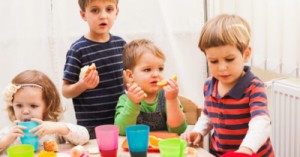While the function of a learning curriculum is to lay out what is going to be taught to children, pedagogical approaches covers all the ways how such a curriculum can be taught. In the early childhood context, the most effective pedagogical approaches are learner centered, active and permit a scaffolding of learning. The following article provides information on EYLF and Pedagogical Approaches, Examples Of Pedagogical Approaches, How To Implement Pedagogical Approaches In Early Childhood, and more.
Pedagogical approaches in early childhood education are diverse and tailored to foster holistic development in young children. Here are some key approaches:
-
Constructivist Approach
-
Socio-cultural Approach
-
Play-based Learning
-
Child-centered Learning
-
Reggio Emilia Approach
-
Montessori Method
-
High Scope Approach
-
Waldorf Education
Each of these approaches has unique strengths and can be adapted to suit different educational settings and philosophies.
EYLF and Pedagogical Approaches
The Early Years Learning Framework (EYLF) emphasizes the importance of pedagogical approaches in early childhood education. Pedagogy refers to the holistic nature of an educator’s practice, including the methods and strategies used to facilitate and promote children’s learning. Here are some key pedagogical approaches connected to the EYLF:
-
Holistic Approaches: Teaching and learning through recognition of the mind, body, and spirit. This approach values the whole child and their overall development.
-
Responsiveness to Children: Being responsive to all children by recognizing their individual needs, interests, and abilities. This involves observing, listening, and engaging with children to support their learning.
-
Learning Through Play: Emphasizing the importance of play as a context for learning. Play allows children to explore, discover, and make sense of the world around them.
-
Intentional Teaching: Using intentional teaching practices to support and extend children’s learning. This involves planning and implementing purposeful and meaningful learning experiences.
-
Cultural Competence: Valuing and respecting the cultural and social contexts of children and their families. This includes providing environments that reflect and respect diverse cultures and communities.
-
Continuity of Learning and Transitions: Supporting continuity in children’s experiences and helping them manage transitions. This involves creating smooth transitions between different learning environments and stages of development.
-
Assessment for Learning: Using assessment as a tool to understand and support children’s learning. This includes observing, documenting, and reflecting on children’s progress and using this information to inform teaching practices.
-
Building Relationships: Establishing and maintaining positive relationships with children, families, and the community. This involves working collaboratively to support children’s learning and development.
These pedagogical approaches are intertwined with the principles and practices of the EYLF, promoting a holistic and inclusive approach to early childhood education.
Examples Of Pedagogical Approaches
Here are some examples of pedagogical approaches in early childhood education:
-
Play-Based Learning: This approach emphasizes the importance of play in children’s learning and development. It allows children to explore, discover, and learn through hands-on experiences and interactions with their environment.
-
Child-Centered Learning: This approach focuses on the interests, needs, and abilities of each child. Educators observe and listen to children to plan activities that are meaningful and engaging for them.
-
Montessori Method: Developed by Maria Montessori, this approach encourages self-directed learning through hands-on activities and collaborative play. It emphasizes independence, freedom within limits, and respect for a child’s natural psychological development.
-
Reggio Emilia Approach: This approach views children as capable and competent learners. It emphasizes the importance of a supportive and enriching environment, collaboration, and the role of documentation in understanding and supporting children’s learning.
-
High Scope Approach: This approach is based on active participatory learning, where children have direct, hands-on experiences with people, objects, events, and ideas. It includes a well-defined plan-do-review process that helps children develop problem-solving and critical thinking skills.
-
Waldorf Education: Developed by Rudolf Steiner, this approach focuses on holistic education, integrating academic, artistic, and practical activities. It emphasizes imagination, creativity, and the development of the whole child.
-
Developmentally Appropriate Practice (DAP): This approach involves teaching in ways that match the way children develop and learn. It considers what is known about child development, each child as an individual, and the social and cultural contexts in which children live.
-
Cultural-Historical Approach: Based on the theories of Lev Vygotsky, this approach emphasizes the role of social interactions and cultural tools in children’s learning. It focuses on the importance of language, play, and social interactions in cognitive development.
These approaches provide a variety of methods and strategies to support and enhance children’s learning and development in early childhood education.
How To Implement Pedagogical Approaches In Early childhood
Implementing pedagogical approaches in early childhood education involves several key steps to create meaningful and interactive learning environments. Here are some strategies to help you implement these approaches effectively:
-
Understand Your Learners: Start by getting to know your learners. Understand their abilities, interests, needs, and backgrounds. This helps in tailoring your teaching methods to suit each child’s unique learning style.
-
Set Goals and Expectations: Clearly define what you hope your learners will achieve by the end of the educational year. Setting specific, measurable, achievable, relevant, and time-bound (SMART) goals can guide your planning and assessment.
-
Choose Appropriate Pedagogical Methods: Select teaching methods that align with your educational philosophy and the needs of your learners. For example, you might use play-based learning, hands-on activities, or inquiry-based learning.
-
Design Efficient Learning Experiences: Plan and implement learning experiences that are engaging, purposeful, and developmentally appropriate. Use a variety of activities to cater to different learning styles and keep children motivated.
-
Ongoing Observation and Assessment: Regularly observe and assess children’s progress to understand their learning needs and adjust your teaching strategies accordingly. This helps in identifying areas of growth and providing targeted support.
-
Build Relationships and Interactions: Foster positive relationships with children, families, and the community. Engage with children regularly to build their confidence and self-esteem, and encourage open dialogue.
-
Promote Inclusion and Diversity: Create an inclusive environment that respects and values diversity. Incorporate culturally responsive teaching practices and provide opportunities for children to learn about different cultures and perspectives.
-
Use Technology Integration: Incorporate technology in a meaningful way to enhance learning experiences. Use digital tools and resources to support interactive and collaborative learning.
-
Provide Professional Development: Ensure that educators have access to ongoing professional development opportunities to stay updated with the latest pedagogical practices and research.
By following these steps, you can effectively implement pedagogical approaches that support the holistic development of young children and create a positive and nurturing learning environment.
Further Reading
Maria Montessori: Activities In A Montessori Classroom
Infant And Toddler Pedagogy
EYLF Practices And Strategies To Implement Them
Guide To The Reggio Emilia Approach Scaffolding Children's Learning
Maria Montessori - The Montessori Method
References:
Pedagogy In Early Childhood: Teaching Strategies
Curriculum and Pedagogy, National Academics
EYLF Educators Guide, ACECQA
Pedagogy In Early Childhood, Teach Kloud







 Here’s a comprehensive Mobile Phone and Smart Watch Policy tailored for early childhood education and care (ECEC) services in Australia, aligned with the latest 2025
Here’s a comprehensive Mobile Phone and Smart Watch Policy tailored for early childhood education and care (ECEC) services in Australia, aligned with the latest 2025 Across the early childhood education and care sector, educators are sounding the alarm: current staffing ratios are insufficient to deliver safe, meaningful, and developmentally appropriate
Across the early childhood education and care sector, educators are sounding the alarm: current staffing ratios are insufficient to deliver safe, meaningful, and developmentally appropriate Thanks to the new National Model Code and upcoming regulatory changes under the National Quality Framework (NQF), early childhood services across Australia must now implement
Thanks to the new National Model Code and upcoming regulatory changes under the National Quality Framework (NQF), early childhood services across Australia must now implement In the quiet hum of a weekday morning, something felt off. Preschool doors opened, but classrooms remained silent. No greetings. No redirection. No educators. And
In the quiet hum of a weekday morning, something felt off. Preschool doors opened, but classrooms remained silent. No greetings. No redirection. No educators. And A: In early childhood education and care (ECEC) settings across Australia, mobile phone use by educators is now subject to strict national reforms aimed at
A: In early childhood education and care (ECEC) settings across Australia, mobile phone use by educators is now subject to strict national reforms aimed at The end of the year is a busy and emotional time in early childhood services. Many services close for a short period over Christmas, and
The end of the year is a busy and emotional time in early childhood services. Many services close for a short period over Christmas, and Being an educator is both rewarding and demanding. Between planning, documentation, room management, and supporting children’s wellbeing, the workload can feel overwhelming. That’s why practical
Being an educator is both rewarding and demanding. Between planning, documentation, room management, and supporting children’s wellbeing, the workload can feel overwhelming. That’s why practical In early childhood education and care, child safety is not just a number—it’s a practice. While educator-to-child ratios are essential, they are only one part
In early childhood education and care, child safety is not just a number—it’s a practice. While educator-to-child ratios are essential, they are only one part A: Something as simple as a child asking to braid an educator’s hair—or children braiding each other’s can spark important questions about connection, trust, and
A: Something as simple as a child asking to braid an educator’s hair—or children braiding each other’s can spark important questions about connection, trust, and Here's a comprehensive, sector-responsive policy and procedure framework for the safe use of digital technologies—including CCTV—tailored for early childhood education settings. It balances child safety,
Here's a comprehensive, sector-responsive policy and procedure framework for the safe use of digital technologies—including CCTV—tailored for early childhood education settings. It balances child safety,


